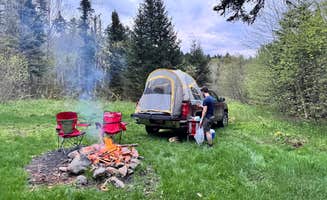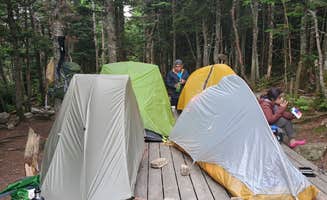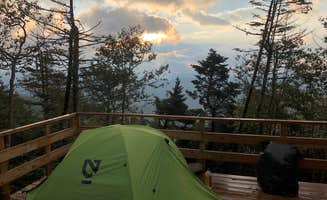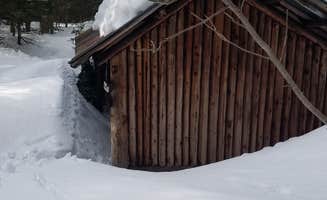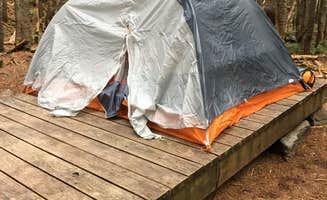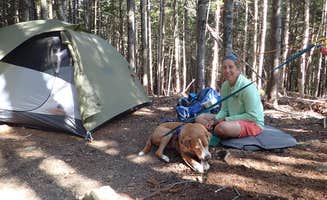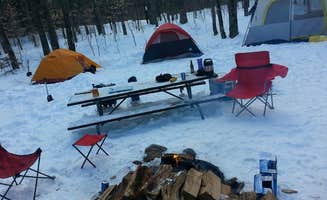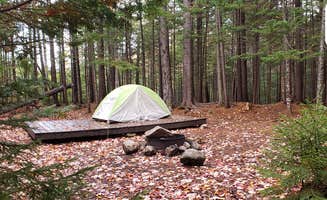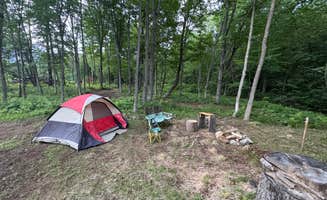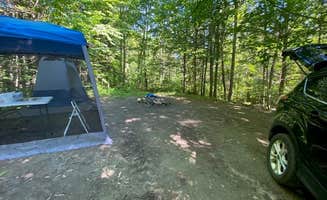Dispersed camping in the White Mountain National Forest near Twin Mountain, New Hampshire offers backcountry experiences at elevations ranging from 1,200 to 4,000+ feet. The camping areas provide access to the Presidential Range and Franconia Ridge with temperatures that can fluctuate significantly between daytime and nighttime, even in summer months. Many sites require hiking with elevation gains of 1,000-3,000 feet to reach designated camping areas.
What to do
Hike to mountain ponds: The Sawyer Pond trail offers a family-friendly 1.5-mile hike to a peaceful campsite. "The pond is gorgeous and the stars were AMAZING. You do have to forage for firewood, which can be rough, but there's a fire pit right in front of the lean to. I've never seen stars like I did here, all around the pond," one camper reported.
Summit nearby peaks: From Liberty Springs Tentsite, campers can access Franconia Ridge. A reviewer noted it's "Located just off of Franconia Ridge, a great basecamp for anyone doing the ridge or a pemi loop." The site offers a strategic location for multi-day hikers tackling the challenging terrain.
Explore waterfalls: Several camping areas provide access to local waterfalls. At Ethan Pond Shelter, one camper mentioned, "3 mile hike in from Ripley Falls parking lot, a nice spur trail to a water fall to explore on the hike up or down." The waterfall makes a good side trip for day hikers or overnight campers.
What campers like
Cold water access: Many tent campers appreciate the natural water sources near Twin Mountain. At Fourth Iron Campground, a reviewer mentioned, "Sites are situated just off the Sacco River and river access is easy, with multiple rocky beaches in between the sites and river. The water is clear and cold, refreshing on a warm day."
Stargazing opportunities: The minimal light pollution creates exceptional night sky viewing. A camper at Sawyer Pond shared, "The lake is just steps away from the camping sites and is absolutely beautiful. I would stay here again!"
Bear protection systems: The Garfield Ridge Campsite provides "Large eating area. Great water source. Clean privy. Helpful staff. Approx 6 platform sites and shelter." Another camper noted the "Joe boxes for bear protection" which help secure food from wildlife.
What you should know
Platform limitations: Most backcountry sites have wooden platforms that require freestanding tents. As one Liberty Springs camper explained, "Tent sites are platforms, so make sure to have a free standing tent. There are a couple 'overflow' spots the caretaker may let you stay in if you can't use a platform."
Water treatment required: All natural water sources need treatment before consumption. A Fourth Iron camper advised, "There is no potable water available here, so be prepared to treat (filter, boil, chemical, etc.) or carry in enough water for your stay."
Weekend crowding: Popular sites fill quickly, especially during summer and fall. A visitor to Liberty Springs observed, "Gets packed on weekends," while a Garfield Ridge camper noted, "When we arrived there were very few spots left. There are some overflow spots near the spring."
Tips for camping with families
Choose appropriate trails: For families with young children, select camping areas with shorter approach hikes. The Valley Way Tentsite offers backcountry camping but requires preparation: "I would not call the Valley Way trail from the parking area at Appalachia to the tent sites 'easy' as you'll gain 2800 feet in elevation over the 3+ miles to the camping area."
Pack for temperature swings: Mountain weather changes rapidly. At Hermit Lake Shelters, a camper shared, "Hermit Lake Shelter is about 2.5 miles up from Pinkham Visitor Center/Trailhead, so you're about halfway to summit – perfect place to camp for a sunrise hike." The elevation means nights can be significantly colder than days.
Look for lean-to options: Shelter structures reduce what families need to carry. A Sawyer Pond visitor explained, "I camped here last year and stayed at the lean to with my dog. The pond is gorgeous and the stars were AMAZING." Lean-tos provide protection from sudden weather changes.
Tips from RVers
Consider tent camping alternatives: The area near Twin Mountain offers limited RV options, making tent camping the primary accommodation. At Fourth Iron Campground, a camper advised, "I would suggest packing in a manner that allows you to get your things from your car to the site easily and with the fewest trips possible."
Base camp strategy: Some RVers park at established campgrounds and use tent camping for backcountry excursions. Tent camping in Twin Mountain, New Hampshire provides better access to high-elevation trails than vehicle camping alone.


